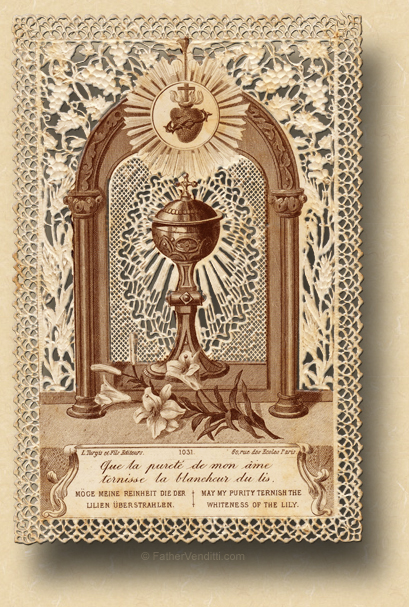The Buffet is Closed.
The Ninth Thursday of Ordinary Time; or, the Memorial of Saints Marcellinus & Peter, Martyrs.
Lessons from the secondary feria, according to the ordinary form of the Roman Rite:
• II Timothy 2: 8-15.
• Psalm 25: 4-5, 8-10, 14.
• Mark 12: 2 8-34.
The Second Thursday after Pentecost; and, the Commemoration of Saints Marcellinus & Peter, Martyrs, and Saint Erasmus, Bishop & Martyr.
Lessons from the dominica,* according to the extraordinary form of the Roman Rite:
• I John 3: 13-18.
• Psalm 119: 1-2.
• Luke 14: 16-24.
|
If a Mass for the commemoration is taken, first lesson & Gradual from the proper, third lesson from the common:
• Romans 8: 18-23.
• Psalm 33: 18-19.
• Luke 21: 9-19.
|
The Second Thursday of the Apostles Fast; and, the Feast of Our Venerable Father Nicephor the Confessor.
Lessons from the pentecostarion, according to the Ruthenian recension of the Byzantine Rite:
• Romans 8: 22-27.
• Matthew 10: 23-31.
FatherVenditti.com
|
 9:21 AM 6/2/2016 — An extremely brief thought on the two great commandments as explained by our Lord: 9:21 AM 6/2/2016 — An extremely brief thought on the two great commandments as explained by our Lord:
שְׁמַע, יִשְׂרָאֵל: יְהוָה אֱלֹהֵינוּ, יְהוָה אֶחָד (Sh'ma Yis'ra'eil, Adonai Eloheinu, Adonai Echad): “Hear, O Israel! The Lord is God. The Lord is One.” The first of the two great commandments is from Deuteronomy (6: 4). It's what a devout Jew will tack on the door-post of his home. The second commandment is word for word from Leviticus: “Do not seek revenge, or bear a grudge for wrong done to thee by thy fellow-citizens; thou shalt love thy neighbour as thyself; thy Lord is his” (19: 18 Knox). What is new in the teaching of Jesus is the fact the He puts these two commandments together and puts them in a certain order. This one is first, and the other is second. That's the point that Jesus is making. And when you think about it, you can see how important a point that is for us in our time.
There are too many today who seek to assuage a guilty conscience by having recourse to the corporal works of mercy. That's not to say that they aren't important, or that they don't cancel a multitude of sins, because they do; and, we know our Holy Father is encouraging us to rededicate ourselves to the care of the poor and the needy. I'm not contradicting him, but only pointing out the danger: the danger of reinventing the Gospel of Jesus Christ, seeing it as nothing more than a blueprint for social justice, and Christian living as simply a matter of feeding the hungry and sheltering the homeless, having little, if anything, to do with how we live our private lives. This is rooted in the inability of modern man to acknowledge a truth outside of himself, which results in him professing a religion of which he knows little, making it up for himself as he goes along. Christians who think this way are really the Scribes of our time, who, like their counterparts of the first century, think that they have it all figured out. And it takes the Divine wisdom of Our Lord to put it all back in perspective so simply: yes, we must do good for others;— that is a part of the Gospel message—but, we must do it for the right reason. It is not our good works themselves that please God, but the fact that they are done for Him, in conjunction with an otherwise holy life; just as the Psalmist says, "…here, O God, is my sacrifice, a broken spirit; a heart that is humbled and contrite thou, O God, wilt never disdain" (51: 19 Knox).
Practically speaking, we have to look at our own lives. How many of us think that we are all right before God because of all the wonderful things we've done for our fellow man or even for the Church, when the real question should be: "When was the last time I went to confession? When did I last really prepare myself for Holy Communion? When did I do something for God that wasn't rooted in the social gospel but rather in the moral gospel?" God want's our good works only if they bring us closer to Him and motivate us to live holy and moral lives; otherwise they are worthless to Him. All that is important to God is that we are His: heart, mind, and soul.
As we offer up together the Sacrifice of the Lord's Body and Blood, let us remember that, if we can't offer ourselves, then we have nothing of value to offer.

* In the extraordinary form, on the ferial days outside of privileged seasons, the lessons are repeated from the previous Sunday.
|

